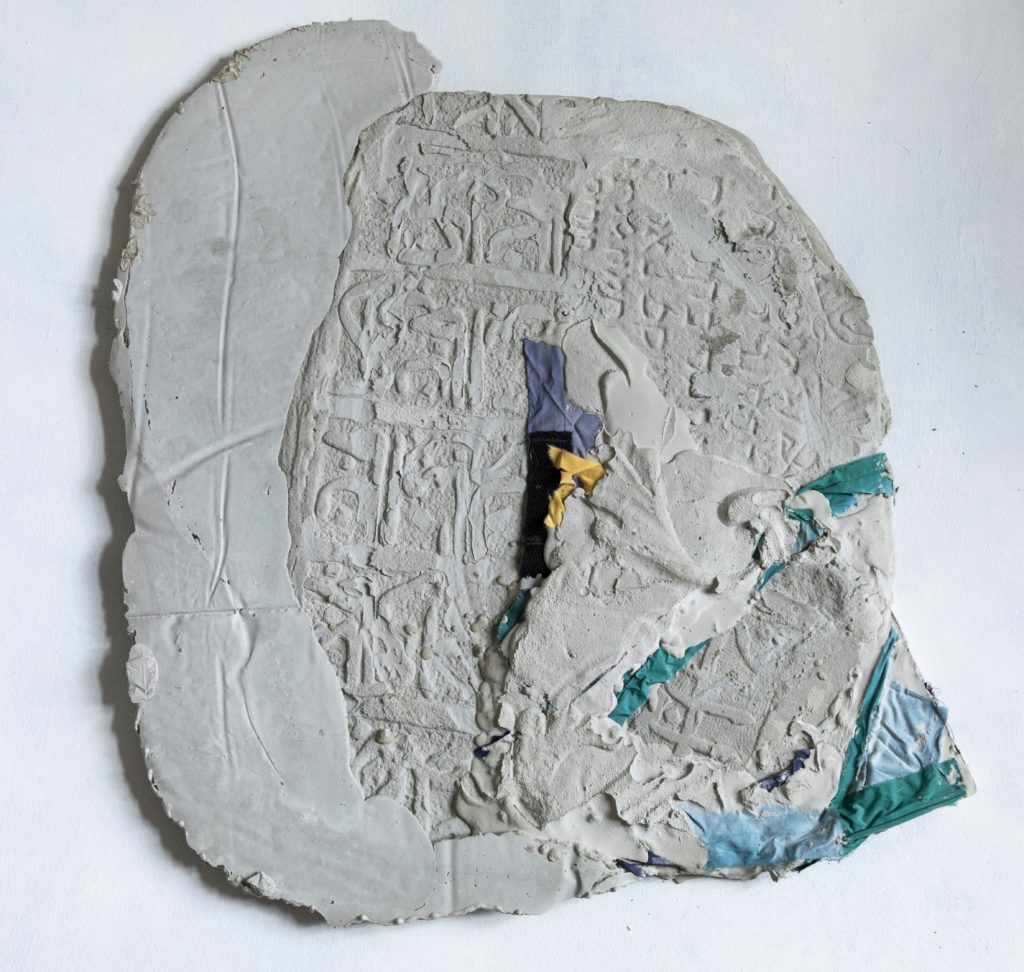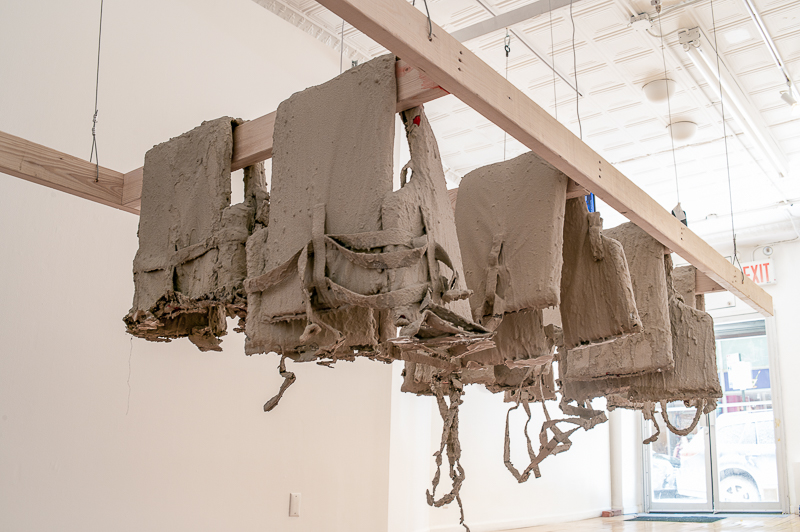PAST EXHIBITION
Archeology of Loss
Marina Leybishkis
Location:
Exhibition Dates:
Opening Reception:
Artist:
PAST EXHIBITION
Archeology of Loss
Marina Leybishkis
Archeology of Loss—Leybishkis’s solo exhibition—takes the form of an immersive installation incorporating sculpture, video, and sound, and poses crucial questions around history, migration, and image-making.
The works presented draw upon the artist’s research and work during both her 2020 residency at Baxter St and a 2018–19 Fulbright grant. Leybishkis traveled to Greece, visiting the Moria Reception, Kara Tepe, and Identification Centre on the island of Lesvos, at that time the largest refugee camp in Europe and home to thousands of migrants, many fleeing wars in Afghanistan, Syria, and Iraq.
While the works were produced in relation to Leybishkis’s work with refugees, their bodies are hidden from view. Instead, landscape and artifacts embody their stories. A series of concrete sculptures incorporate scraps of fabric salvaged from life preservers strewn along Lesvos’s north shore. The migrants’ experiences are encased in larger narratives of conquest and cultural exchange, the refuse of their journey made visible even as the concrete’s weight threatens to pull their wearers out of sight. The sculptural forms echo those of cultural artifacts in museums across Europe, highlighting a contradiction in which countries display the riches of colonial conquest yet refuse people at their borders.

In dialogue with the sculptures is a looped video shot from the shore, depicting the water migrants cross between Turkey and Lesvos. A boat crosses the screen, patrolling the invisible border that draws the connection between Greece and Turkey. This tension, along with the absence of human subjects in the sculptures, points to the disappearance of international news coverage about the refugee crisis—the migrants’ stories, like the materials of their existence, slipping from view beneath the weight of the 24-hour news cycle.
The artist makes no argument or thesis about resolution or next steps; instead, she poses questions and captures contradictions, presenting the viewer with a haunting installation exploring time, memory, conquest, and cultural preservation.
Archaeology of Loss continues Baxter St’s commitment to supporting emerging artists. The Workspace Residency program, now in its thirteenth year, offers lens-based artists much-needed workspace in New York City. The program provides participating artists with three months of free access to darkrooms and digital workstations as well as to the Baxter St community and programs. The Baxter St at CCNY Workspace Residency Program is made possible by generous support from the New York State Council on the Arts with the support of Governor Andrew Cuomo and the New York State Legislature; The Jerome Foundation; public funds from the New York City Department of Cultural Affairs, in partnership with the City Council; and Fujifilm.

Marina Leybishkis is a New York based multimedia interdisciplinary artist who was born and raised in Uzbekistan. She holds a BA in Justice and Humanities Studies from The City University of New York and MFA from The School of the Art Institute of Chicago. She was a recipient of the Fulbright grant for artistic research in 2018-2019.
“The hand and eye study closely, hoping to decipher what traces hide along its surface; marks or gestures to guide the pursuit are little more than traces, fragments, shards. Their accumulation brings together something initially withheld; through close attention a story reveals itself allowing the site to open like the portal to a buried past, granting the viewer a vision into and beyond the surface. The site becomes a source of sight, the physical gives way to theoretical, what’s buried rises into view. The hand reveals to the eye what only touch can deduce; allowing what is concealed to catch light and render the invisible exposed.
The camera does the same.
Both impressions become entangled in the remains. What then of loss? Those parts of the whole untouchable, unseen, forgotten.
If archaeology looks at what is in order to see what was, hoping to capture the present’s connection to its past; photography is not only a means of holding such information but a powerful and poignant tool of its own discovery.
Something always escapes, falls away, is lost.
In Archaeology of Loss, Marina Leybishkis poses again the question often asked and rarely sufficiently answered, can an image be made rather than taken; it’s subject shown without becoming subjected to the viewer’s assumptions? The trigger clicks, the camera shoots bringing the target into focus —something is captured—but what survives?
The photographer and archaeologist are one in the same writing fictions and facts, filling in gaps in an archive, seeking to preserve what would otherwise be lost to time.
In her latest installation accompanied by a video projection of coastal footage, one thing seems poignantly out of frame in Leybishkis’ Archaeology of Loss. While the images were produced in relation to her work with refugees entering Greece, their bodies remain hidden from view. Instead the landscape, it’s complicated histories and fraught site come to embody stories of those who cross its borders. In a series of concrete sculptures, the full weight of their experiences are encased in larger narratives of conquest and cultural exchange. Archival images and imprints of cultural ruins point to the artist’s larger questions around archaeological sites and what time remembers. Scraps of fabric salvaged from life preservers strewn along the shore are monumentalized by their connection to concerns of cultural preservation and patronage.
The objects of histories and cultural artifacts visible in museums across Europe beg the question of what is taken or abandoned when the same countries who keep the riches of colonial conquest refuse the bodies at their borders. Through the weight of her materials, Leybishkis elevates the refuse of their refusal to the surface of thought even as the life jackets from their journey now encased in concrete threaten to pull their wearer out of sight. This tension as well as the lack of human subjects points to the disappearance of international news coverage around this crisis in light of “more pressing concerns” and how these stories like the materials of their existence slip from view beneath the weight of the 24-hour news cycle.
The artist makes no argument or thesis about resolution or next steps, but holds the viewer in a time warp that captures collective contradictions, posing more questions than answers in a haunting installation of memory.
The waves wash and wear away at the shore, each pass pulling more down and away, looped in a perpetual return.”
– J. Turk, June 2021
